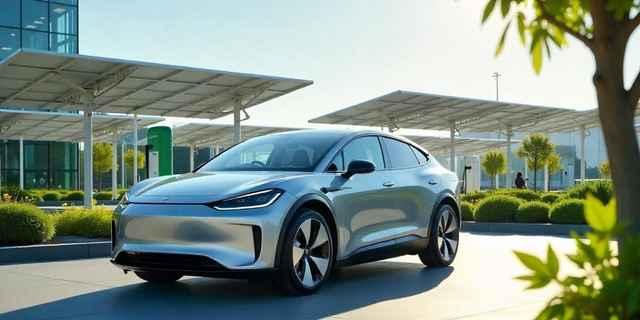Thinking about going electric? Discover the key factors to consider and essential knowledge for a smooth transition. What You Need to Know Before Switching to an EV.
The world is moving towards green transportation, and electric vehicles (EVs) are at the forefront. If you care about the environment or want to cut fuel costs, switching to an electric car is a big step. This guide will help you understand the basics and make the transition smoothly.

Discovering the perks of EVs and learning about charging options and incentives is key. This article gives you the info you need to decide if going electric is right for you. Start this journey with confidence, as we dive into the world of EVs and how to make the switch easy and rewarding.
Understanding the Benefits of Electric Vehicles
The world is waking up to the need to protect our environment. Electric vehicles (EVs) are at the forefront of this movement. They offer a cleaner alternative to traditional cars, with big savings for owners.
Reduced Environmental Impact
EVs are a big win for the planet. They don’t produce direct emissions, which means cleaner air for everyone. This makes them a top choice for those who care about the environment and want to help make transportation greener.
Lower Operating Costs
EVs also save money over time. They cost less to run than cars that use gasoline. Plus, they have fewer parts, which means less need for repairs. This can lead to big savings for EV owners, making them a smart financial choice.
As EV technology gets better and charging spots grow, their appeal grows too. By choosing an EV, people can save money and help the planet. It’s a win-win for both their wallets and the environment.
EV Cost Savings Calculator
What You Need to Know Before Switching to an EV
Thinking about switching to an electric vehicle (EV)? It’s important to know a few key things. Look into the different models, battery range, and how to charge them. This will make your switch to EV driving smooth.
When considering switching to an EV, start by looking at the types of EVs out there. There are many, from small sedans to big SUVs. Knowing the battery size and range helps pick the right car for your daily life.
Another key thing is the charging setup. Learn about public charging spots and home charging options. This lets you plan how to keep your EV charged and ready to go.
Lastly, think about the factors to consider electric vehicle costs. EVs might cost more upfront, but they save on fuel and maintenance over time. Look into government incentives and rebates to help with the initial cost.
By understanding these points and preparing well, you’ll enjoy a smooth transition to driving an electric vehicle.
Charging Infrastructure and Range Considerations
The world is moving towards a greener future, and electric vehicles (EVs) play a big role. Knowing about charging options is key for EV owners. This includes public stations and home charging solutions.
Public Charging Stations
More public charging stations are popping up in the U.S. They’re great for EV owners who need to charge on the go. You can find them at malls, workplaces, and rest stops. They make sure your EV is always ready to go.

Home Charging Solutions
Home charging is a big plus for many EV owners. It lets them charge their cars overnight. This means they wake up to a fully charged battery every day. It’s cheaper and more efficient than using public stations.
Modern EVs can go over 200 miles on one charge. This range, along with more charging stations, makes EVs more appealing. It helps reduce worries about running out of charge.
| Charging Type | Charging Speed | Installation |
|---|---|---|
| Level 1 (Household Outlet) | Slow (3-5 miles/ hour) | Plug-and-play, no installation required |
| Level 2 (Dedicated Charger) | Faster (10-20 miles/hour) | Requires professional installation |
| DC Fast Charging | Fastest (up to 200 miles of range in 30 minutes) | Specialized commercial-grade installation |
Understanding charging options and range helps EV owners enjoy a smooth driving experience. It makes owning an EV convenient and worry-free.
EV Resale Value Calculator
Incentives and Rebates for EV Owners
Switching to an electric vehicle (EV) can save you money. This is thanks to government incentives and rebates. These programs help make eco-friendly cars more affordable for everyone.
The U.S. government offers tax credits up to $7,500 for new EVs. These electric vehicle incentives can lower the initial cost. Many states also offer EV rebates and other incentives for EVs, making electric cars even more affordable.
In California, you can get up to $7,000 back through the Clean Vehicle Rebate Project. New York’s Drive Clean Rebate program gives $2,000 for battery-electric or plug-in hybrids. These state programs, along with federal tax credits, can greatly reduce the cost of an electric car.
As more people want EVs, it’s key to know about the latest electric vehicle incentives, EV rebates, and financial incentives for EVs. Using these programs can make switching to a greener car more affordable and easy.
Why We Should Use Electric Vehicles
Switching to electric vehicles (EVs) is more than a trend. It’s a key step towards a greener future. EVs come with many benefits that make them a popular choice in the U.S. They offer savings and help the environment, making them a smart choice for many.
One big reason to choose EVs is their positive effect on the environment. Unlike gas cars, EVs don’t release harmful emissions. This helps fight climate change and makes our air cleaner.
Also, new battery tech and more charging spots have solved range worries. Now, EVs are easy to use for short and long trips. This makes them a great option for many Americans.